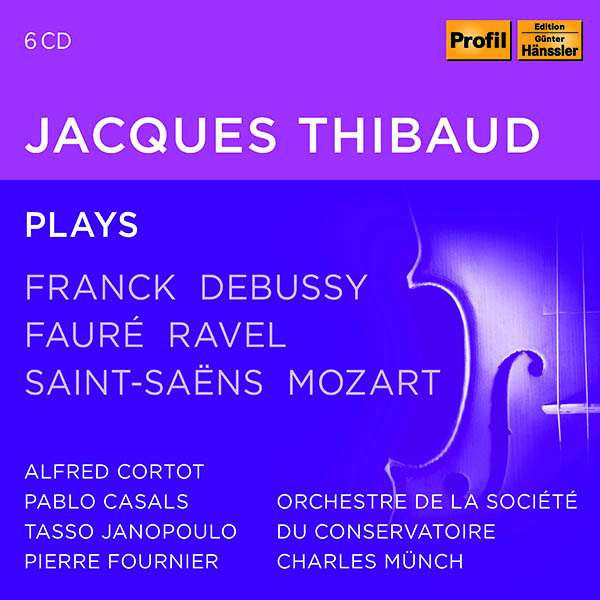Der 1880 in Bordeaux geborene und 1953 bei einem Flugzeugunglück umgekommene Geiger Jacques Thibaud galt als einer der genuinsten Interpreten des französischen Repertoires, unnachahmlich in den Werken von Saint-Saëns, Debussy, Ravel und Fauré. Aber auch das deutsche romantische Repertoire lag ihm, genau wie die Klassiker Mozart und Beethoven. 1905 bildete er mit Alfred Cortot und Pablo Casals ein Trio, dessen Ruf bis heute nicht verblasst ist.
Profil hat aus Archiven-Aufnahmen auf 6 CDs eine Hommage an den Geiger zusammengestellt, darunter so ‘ewige’ Einspielungen wie die Violinsonaten von Franck und Debussy, Beethovens Frühlingssonate, kleinere Stücke aus dem Repertoire des Geigers, Mozart-Konzerte und Trios mit Cortot und Casals, darunter Schuberts B-Dur-Trio, eine immer wieder als perfekt bezeichnete, legendäre Aufnahme von 1926. Auch wer diese Einspielung seit Jahrzehnten kennt, kann bei erneutem Begegnen immer wieder nur staunen über die spontan wirkenden Ausdrucksnuancen, über das drängende, aber nie gehetzte Tempo im ersten Satz, über die hohe Musikalität im Andante.
Dies ist also eine vorzügliche Ehrung von Thibaud, die umso mehr als gelungen bezeichnet werden muss, als die Restaurierungen von bester Qualität sind.
Born in Bordeaux in 1880 and killed in a plane crash in 1953, violinist Jacques Thibaud was considered one of the most genuine interpreters of the French repertoire, inimitable in the works of Saint-Saëns, Debussy, Ravel and Fauré. But the German Romantic repertoire also suited him, as did the classics Mozart and Beethoven. In 1905 he formed a trio with Alfred Cortot and Pablo Casals, whose reputation has not faded to this day. Profil has compiled a tribute to the violinist from archival recordings. The 6 CDs include such ‘eternal’ recordings as the violin sonatas by Franck and Debussy or Beethoven’s Spring Sonata, smaller pieces from the violinist’s repertoire, Mozart concertos and trios with Cortot and Casals, among them Schubert’s B-flat Major Trio, a legendary recording from 1926 repeatedly described as just perfect. Even those who have known this recording for decades can only marvel again and again at the spontaneous expressive nuances, at the urgent but never rushed tempo in the first movement, at the high musicality in the Andante. This is thus an exquisite tribute to Thibaud, which must be called all the more successful because the restorations are of the best quality.




















